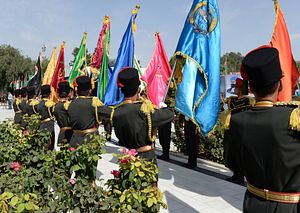International donors are gearing up to contemplate their financial commitments to Afghanistan once more. The two day conference, which will take place in Brussels next week, follows on from the 2012 Tokyo conference at which major donors pledged $4 billion annually in development aid through 2015. But four years on, billions in aid later, Afghanistan seems no more stable in either the security or political realm.
The massive gathering–70 countries and 20 international organizations are expected to participate–aims to “endorse a realistic program of reforms to bring about the Afghan government’s vision and to ensure continued international political and financial support” for the country.
Donors are expected to commit to the same level of aid–$4 billion annually–although a leaked memo obtained by The Guardian indicates that the EU will make some aid contingent on Kabul accepting some 80,000 deported asylum seekers. The leaked memo underscores one of the conclusions–that aid conditionality has not been consistently effective in influencing Afghan government behavior–in a report released today by the Special Inspector General for Afghanistan Reconstruction, an independent U.S. oversight body. The report–part of SIGAR’s recently launched lessons learned project–was based on a closed-door conference convened in the spring at the U.S. Institute of Peace which included among its participants seven sitting ambassadors, five former ambassadors, the U.S. special representative for Afghanistan and Pakistan, as well as representatives from major donor countries and organizations.
The report (PDF) cites four themes stemming from the discussions. First, conflicts between divergent goals and different actors resulted in the pursuit of “disparate and sometimes ill-defined missions in Afghanistan.” The tension between pursuing short term security goals and investing in long term development combined with individual states having to balance civilian and military initiatives, resulting in confusion across the board.
Second, shared goals were necessary for coordination among donors–but donors had difficulty establishing their own own goals, let alone coordinating strategically. Many countries, the report notes, “were primarily motivated by their alliance commitments to the United States, rather than specific strategic goals related to Afghanistan.” With focus on Washington, the effect of U.S. interagency disagreement on goals and strategies bled into the coalition’s efforts.
Third, local knowledge and Afghan buy-in were essential for the success of development projects. Importantly, “conference participants tended to agree that development projects did not ‘buy’ security.” Furthermore, while in theory aid conditionally–predicating aid on specific reforms, for example–can improve governance, such a transactional approach has been of limited utility. A primary limitation, participants said, was the credibility of donors:
Donors sometimes tried to condition funds required for the functioning of the Afghan government, for example, paying the salaries of the ANP. These conditions were often not credible, as donors were ultimately unwilling to withhold funds that were essential to preventing the collapse of the Afghan government.
The presence of multiple donors also hamstrung such conditionality arrangements. “When faced with a donor’s unwanted conditions, Afghan officials could often obtain funding from another donor.” When conditionality worked, it was tied to “extra” funds used as incentives rather than base budgets.
A last theme examined was that of institutionalizing lessons learned. Participants highlighted the value of organizations “that were flexible, adaptable, and able to work at the local level.” (For more on institutionalizing lessons learned, read my article from earlier this month on the topic).
These themes ought to be on the mind of world leaders and donors gathering next week in Brussels. The specific amount of aid commitment matters less than the ability of donors to coordinate and hold realistic expectations for what can be accomplished.
But as the leaked memo demonstrates, the crafting of a carefully considered coordination strategy for aid to Afghanistan will be hampered by individual donors’ national interests and domestic political needs, including Afghanistan itself. The Afghan National Unity Government remains in a kind of legitimacy limbo; promised electoral and political reforms have yet to materialize and President Ashraf Ghani is frequently at odds with Chief Executive Abdullah Abdullah. At the same time, the country is no more secure than it was four years ago.
Meanwhile, Europe is in turmoil over how to respond to terrorism on the continent, how to manage the wave of both Syrian and Afghan refugees, and faced with uncertainty about EU unity following the Brexit vote. These all will influence how the EU–co-hosting the Brussels summit with Afghanistan–will approach formulating aid for Afghanistan.
Across the Atlantic, the United States is well and fully distracted by the strangest and most important presidential election in recent memory. The two candidates-Hillary Clinton and Donald Trump–couldn’t be further apart when it comes to how they would manage the U.S. government. Clinton appears to be the voice of the status quo, whereas Trump represents an abject rejection of business as usual.

































